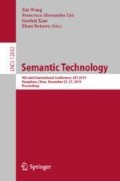Abstract
This paper describes an ontology-based development of activity knowledge on a domain and the system we developed to support it. To understand human activities, it is important to explicitly describe the knowledge of each domain. However, there are some issues of knowledge development: the establishment of the efficient method and process, the improvement of the readability for humans and machines, and the regular improvement of knowledge after development. We thus introduced a process of knowledge development, which uses two different types of knowledge representation (activity knowledge and domain ontology) on a domain that requires technical skills. In this study, we practiced the process in the music field to investigate the effects of developing activity knowledge based on a domain ontology. The results showed that it enables deep understanding and extension of knowledge. Furthermore, we designed a system to help the ontology-based development of activity knowledge. We rewrote the activity knowledge using the system and received preliminary results on term control.
Access this chapter
Tax calculation will be finalised at checkout
Purchases are for personal use only
Notes
- 1.
- 2.
- 3.
We used the English version 2.3. https://github.com/guitar-san/Guitar-Rendition-Ontology.
References
Andrea, W., Rebecca, T.: Ontology development by domain experts (without using the “O” word). Appl. Ontol. 12, 299–311 (2017)
Bada, M., et al.: A short study on the success of the gene ontology. Web Semant. Sci. Serv. Agents World Wide Web 1(2), 235–240 (2014)
Halilaj, L., et al.: VoCol: an integrated environment to support version-controlled vocabulary development. In: Blomqvist, E., Ciancarini, P., Poggi, F., Vitali, F. (eds.) EKAW 2016. LNCS (LNAI), vol. 10024, pp. 303–319. Springer, Cham (2016). https://doi.org/10.1007/978-3-319-49004-5_20
Hogan, A.: Skolemising blank nodes while preserving isomorphism. In: Proceedings of the 24th International Conference on World Wide Web, International World Wide Web Conferences Steering Committee, pp. 430–440 (2015)
Iino, N., Nishimura, S., Fukuda, K., Watanabe, K., Jokinen K., Nishimura, T.: Development and use of an activity model based on structured knowledge - a music teaching support system. In: IEEE International Conference on Data Mining, The 5th International Workshop on the Market of Data (2017)
Iino, N., Nishimura, S., Nishimura, T., Fukuda, K., Takeda, H.: The guitar rendition ontology for teaching and learning support. In: IEEE 13th International Conference on Semantic Computing (2019). DOI: https://doi.org/10.1109/icosc.2019.8665532
Joo, S., Koide, S., Takeda, H., Horyu, D., Takezaki, A., Yoshida T.: Agriculture activity ontology : an ontology for core vocabulary of agriculture activity. In: The 15th International Semantic Web Conference (2016)
Joo, S., Koide, S., Takeda, H., Horyu, D., Takezaki, A., Yoshida T.: A building model for domain knowledge graph based on agricultural knowledge graph, SIG-SWO-047-10 (2019)
Jupp, S., et al.: Populous: a tool for building OWL ontologies from templates. BMC Bioinform. 13(Supplement 1) (2012)
Kamruzzaman, S.Md., Krisnadhi, A., Hitzler, P.: OWLAx: a protégé plugin to support ontology axiomatization through diagramming. In: 15th International Semantic Web Conference (2016)
Kitamura, Y., Koji, Y., Mizoguchi, R.: An ontological model of device function: industrial deployment and lessons learned. Appl. Ontol. 1(3–4), 237–262 (2006)
Kolozali, S., Barthet, M., Fazekas, G., Sandler, M.: Knowledge representation issues in musical instrument ontology design. In: 12th International Society for Music Information Retrieval Conference, pp. 465–470 (2011)
Lisena, P., et al.: Controlled Vocabularies for Music Metadata. In: Proceedings of the 19th ISMIR Conference, 424–430 (2018)
Lohmann, S., Negru, S., Haag, F., Ertl, T.: Visualizing ontologies with VOWL. Semant. Web 7(4), 399–419 (2016)
Mallea, A., Arenas, M., Hogan, A., Polleres, A.: On blank nodes. In: Aroyo, L., et al. (eds.) ISWC 2011. LNCS, vol. 7031, pp. 421–437. Springer, Heidelberg (2011). https://doi.org/10.1007/978-3-642-25073-6_27
Nishimura, S., et al.: CHARM as activity model to share knowledge and transmit activity knowledge and its application to nursing guidelines integration. J. Adv. Comput. Intell. Intell. Inform. 17(2), 208–220 (2013)
Rashid, S.M., McGuinness, D.L., Roure, D.D.: A music theory ontology. In: International Workshop on Semantic Applications for Audio and Music (2018)
Stellato, A., et al.: VocBench: a web application for collaborative development of multilingual thesauri. In: Gandon, F., Sabou, M., Sack, H., d’Amato, C., Cudré-Mauroux, P., Zimmermann, A. (eds.) ESWC 2015. LNCS, vol. 9088, pp. 38–53. Springer, Cham (2015). https://doi.org/10.1007/978-3-319-18818-8_3
Tudorache, T., Nyulas, C., Noy, M.F., Musen, M.A.: WebProtégé: a collaborative ontology editor and knowledge acquisition tool for the web. Semant. Web 4(1), 89–99 (2013). https://doi.org/10.3233/SW-2012-0057
Uschold, R., Gruninger, M.: Ontologies: principles, methods and applications. Knowl. Eng. Rev. 11(2), 93–136 (1996)
Raimond, Y., Abdallah, S., Sandler, M., Giasson, F.: The music ontology. In: Proceedings of the International Conference on Music Information Retrieval, pp. 417–422 (2007)
Author information
Authors and Affiliations
Corresponding authors
Editor information
Editors and Affiliations
Rights and permissions
Copyright information
© 2020 Springer Nature Switzerland AG
About this paper
Cite this paper
Iino, N., Takeda, H., Nishimura, T. (2020). An Ontology-Based Development of Activity Knowledge and System Design. In: Wang, X., Lisi, F., Xiao, G., Botoeva, E. (eds) Semantic Technology. JIST 2019. Lecture Notes in Computer Science(), vol 12032. Springer, Cham. https://doi.org/10.1007/978-3-030-41407-8_24
Download citation
DOI: https://doi.org/10.1007/978-3-030-41407-8_24
Published:
Publisher Name: Springer, Cham
Print ISBN: 978-3-030-41406-1
Online ISBN: 978-3-030-41407-8
eBook Packages: Computer ScienceComputer Science (R0)

